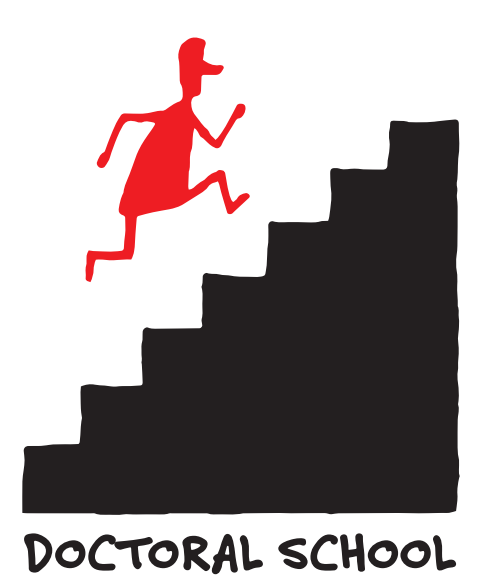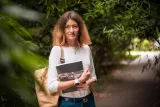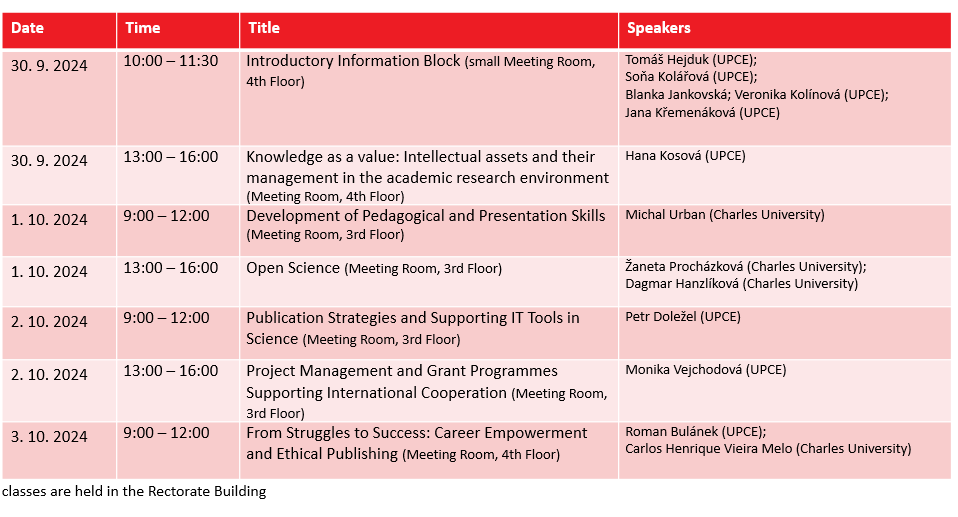The University Doctoral School provides centralised education for doctoral students through a series of teaching sessions on various topics. These sessions introduce and present examples of good practices in research ethics, text production, citations, academic writing, and more.
The aim of the University Doctoral School is to enhance the skills of early career researchers in specific areas of science and research. These skills and competencies are essential for the personal and professional development of early career researchers and are valuable across different sectors.
The teaching sessions are led by active, experienced scientists and subject matter experts.
You can participate and earn a certificate!

University Doctoral School at the University of Pardubice
The 2nd year of the University Doctoral School will commence at the beginning of the winter semester 2024/2025, from September 30 to October 3, 2024. A new feature this year is that some specialised sessions will be conducted in both Czech and English.
Upon completing a minimum of three specialised teaching blocks, students will receive a certificate of completion from the University Doctoral School. If a student completes the same block in both Czech and English, it will only be counted once towards the certificate.
The University Doctoral School is a unique opportunity for our PhD students who wish to familiarise themselves with modern trends in scientific and academic activities and gain a competitive edge at the start of their scientific careers.
Introductory Information Block
In the introductory block, you will become acquainted with the UPCE environment and systems, as well as the project opportunities offered by national providers. Additionally, you will receive information on support for science and research, library services, and an introduction to Mentoring.
Lecturer: doc. Mgr. Tomáš Hejduk, Ph.D.; Mgr. Soňa Kolářová, Ing. Blanka Jankovská, Mgr. Veronika Kolínová, Ing. Jana Křemenáková
Knowledge as a value: Intellectual assets and their management in the academic research environment
Intellectual property vs. intellectual assets? Know-how? Tacit knowledge? Patents? Utility designs? Articles, software, data… How to deal with all of this while staying on the legal side of all the rules? And ideally how to treat all the knowledge in such a way allowing you to achieve all your academic goals, publishing what and when you need as well as creating an additional value and maybe even generating extra financial or societal benefits? Intellectual assets is quite a complex topic but we will try to guide you through it in a condensed and practical way aimed particularly at PhD students’ needs.
Lecturer: Ing. Hana Kosová
https://www.linkedin.com/in/hanakosova
Development of Pedagogical and Presentation Skills
Do you have a class coming up and would you like to prepare as well as possible? Wondering how to use evidence-based approaches in education and examples of good practice? Or have you already started teaching and would like to improve your teaching? Do you want to learn how to transfer your expertise and skills to your students in the most effective way? How to boost your confidence as a teacher? How to motivate your students? What is really important in your work of university teacher? If you answer yes to at least one of these questions, then feel free to attend this session.
It aims to offer a basic insight into didactics, regardless of your field of study. We will focus mainly on practically applicable information, methods and activities, and will not lecture about educational theories. You will learn how to better plan, conduct and reflect on your lessons and engage your students more and more effectively - whether you are doing a one-off seminar or a semester-long course. Needless to add that not only you, but also your students will appreciate it.
Lecturer: Mgr. Michal Urban, Ph.D. (Charles University)
Open Science
The principles of open science are gradually becoming an integral part of scientific work, either because of intrinsic motivation or because of the demands of research funders. In this talk you will learn why you should be interested in open science and what all falls under this broad umbrella. In particular, we will take a closer look at open access to scientific publications, why open science also includes research data management, what data management plans are and how to create them, and last but not least, we will look at the benefits and pitfalls of open science.
Lecturer: Mgr. Žaneta Procházková, Mgr. Dagmar Hanzlíková (Charles University)
Publication Strategies and Supporting IT Tools in Science
The content of this module represents an essential element for students and researchers across various fields who aim to successfully establish themselves and communicate their scientific findings. The objective is to provide participants with a comprehensive insight into modern publishing strategies while acquainting them with key IT tools that enable the effective creation, presentation, and dissemination of scientific results. The module content includes an introduction to editorial systems, advanced word processors, citation and reference management, and more.
Lecturer: prof. Ing. Petr Doležel, Ph.D (UPCE)
Project Management and Grant Programmes Supporting International Cooperation
The first part of the workshop will be focused on introduction of grant programmes supporting international cooperation in research, innovation and education. It will include information about relevant calls, their rules and conditions. The second part will be focused on main aspects and strategies how to prepare a competitive project proposal and on the management of successful projects.
Lecturer: Ing. Monika Vejchodová (UPCE)
From Struggles to Success: Career Empowerment and Ethical Publishing
Publishing is the most important means of scientific communication and an integral part of the life of every scientist, academic, and doctoral student. The creation of a publication is connected not only with creativity and scientific erudition but also with the ability to communicate, coordinate, cooperate, think strategically, and make decisions. The publication is, at the same time, a "commodity" by means of which the performance and success of a scientist and, thus, his "price" are measured. And where money and prestige are concerned, there are also many pitfalls. Distinguishing the often thin line between ethical and unethical approach and pragmatism is sometimes difficult even for a seasoned veteran of scientific work. It is all the more difficult for PhD students or young scientists.
Doctoral students benefit from learning with engaged peers as they develop advanced analytical, comunication, and interpersonal skills towads becoming experts in their field. However, doctoral students also endure financial hardship, work long hours, and struggle to maintain work-life balance while trying to meet often unreasonable academic expectations, leading to high anxienty levels. Nevertheless, raising students’ awareness of future career prospects and empowering them with skills to promote their career and to network with employers may help them overcome uncertainties about future carrer prospects.
Lecturer: prof. Ing. Roman Bulánek, Ph.D. (UPCE); Carlos Melo, Ph.D. (Charles University)
Invitation
| Files for download | Size |
|---|---|
| Invitation - pdf | 199 kB |

